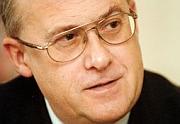ARMS DEALING: Case Study, Part 3
Gripen evidence lacks clout: state attorney
New leads provided by the British police will likely lead to the reopening of the investigation of the allegedly corrupt attempts of the U.K.'s British Aerospace Systems (BAE) to sell jet fighters to the Czech Republic, the Supreme State Prosecutor’s Office said Feb. 23.
However, the office maintained its stance that despite the heated publicity generated by a Swedish public television exposé on the affair, no new compelling evidence has been presented. Critics responded by saying they were unsure just how “concrete” the evidence needs to be before any action can be taken. Despite the documentary's corroboration of evidence that BAE used agents in an attempt at bribing Czech politicians into voting for the purchase of 24 Gripen fighters, Supreme State Prosecutor’s Office attorney Ivona Horská said the program had not provided the kind of specific evidence that could lead to an automatic reopening of the probe. “Whether or not this is enough evidence to produce a conviction is up to the police to decide; we just know that everything we are reporting is true and that it is only the tip of the iceberg,” Fredrik Laurin, one of the reporters who worked on the news report, told CBW. Swedish chief prosecutor Christer van der Kwast said he was conducting preliminary investigations into the role of BAE Gripen consortium partner and Swedish company SAAB in the case, but added that he is not certain at this point that SAAB had taken part. The U.K.'s Serious Fraud Office (SFO) has been investigating BAE's approach to selling its wares in six countries since 2004, but SFO spokesman David Jones would not detail any of the evidence that could be passed on to Czech police. Accusations of corruption in connection with the fighter jet tender have been circulating since May 2001, when all the bidders in the tender except SAAB/BAE suddenly dropped out at the same time, citing “a lack of clarity in the time of the tender.” At the time, U.S. Air Force Lieutenant General Tome Walters Jr., who is director of the Defense Security Cooperation Agency at the U.S. Office of the Secretary of Defense, stated more bluntly that “we cannot ignore the numerous reports suggesting that a clear favorite has already emerged even prior to the submission of all the proposals.”
Suggestions of bribery
In May 2002, with Czech Parliament discussing the tender, Michael Žantovský, then chairman of the now-defunct Civic Democratic Alliance (ODA), said someone had called him offering him money in return for his backing in a vote on the Gripen proposal. The police were able to ascertain that a bribery attempt did occur, but could not identify who was responsible for it. Senators Přemysl Sobotka (Civic Democrat/ODS) and Jitka Seitlová (Independent), both claimed to have received similar offers.
In 2003, Anthony Wayne, then an assistant secretary in the U.S. State Department who is currently the American ambassador to Argentina, told the U.K. Ministry of Defense's (MoD) permanent secretary Kevin Tebbit that BAE was guilty of “corrupt practices.”
British daily The Guardian claimed his words were based on evidence from the CIA and the US Department of Commerce, although the U.K. MoD said at the time that the allegation “had never been substantiated by any evidence whatsoever.”
The British MoD's official position has since changed to “we cannot comment on matters currently under investigation.” Wayne told CBW he could not comment on the issue at this time, but he encouraged further investigation.
The Swedish TV report was anchored by the claims of an anonymous source who said that Steve Mead, the head of BAE in the Czech Republic, talked openly about bribing Czech officials.
It also disclosed numerous documents related to transfers of money to intermediaries named as Count Alfons Mensdorff-Pouilly, arms seller Richard Háva of Omnipol and Czech-Canadian Otto Jelínek, a former Deloitte consultant who was also the Czech government coordinator for the Czech Republic’s image abroad. The exposé threw light on contracts specifying that Pouilly would receive 4 percent of 1 billion British pounds (Kč 42.2 billion/€ 1.5 billion) if the project succeeded, while Háva would receive 2 percent of one and a half billion British pounds. The report did not have specific numbers concerning Jelínek, although Jelínek told the Swedish reporters that he would have received a commission if the Gripen sale proceeded.
Johan Lehander, managing director of Gripen International Saab, dismissed the contracts as nothing extraordinary. “The agreements we close when we export the Gripen are about very large sums, and accordingly ... I suppose it was estimated at that time, that it was worth it to have these advisers for these sums,”
he said.
John Neilson, director of media relations for BAE, gave CBW the same response he has given all other media enquiries: “BAE Systems continues to cooperate fully with the SFO inquiry. The continued reporting of allegations against us represents an attack on the reputation of our company and individuals. Our company continues to reject the allegations being made.”
At the time of the alleged corruption, Gripen fighters were produced in a joint venture between SAAB and BAE. Nowadays, the production is entirely carried out by SAAB, but BAE assists with marketing the fighters.
2.3.2007 - Kerry Skyring
The Czech Republic may be facing one of the biggest corruption scandals in the country's history. Britain's Serious Fraud Office is running an investigation into whether Czech politicians accepted bribes from one of the British military's main arms suppliers, BAE Systems.
In 2002, the government headed by Social Democrat Milos Zeman decided to replace the army's ageing fleet of MiG-21s with twenty-four Gripen fighter jets from the British-Swedish consortium BAE Systems/SAAB. The cabinet approved the 60 billion crown (2.8 billion US dollars) purchasing contract in April but failed to get the green light from the Senate and in the end the Czech Republic leased rather than bought the planes.But a closer look into the accounts of BAE Systems has the British Serious Fraud Office suspecting that the company spent large amounts of money on bribes in an effort to get Czech politicians to support the deal. The case is now under investigation by anti-corruption police departments in the Czech Republic, Britain, and Sweden but also by investigative journalists.
The scandal developed further, when Swedish TV broadcast secretly made recordings of former Czech foreign minister Jan Kavan. In them, he confirms that Czech politicians took bribes and implies that a Czech police investigation could be influenced.Reporter: "Would it be possible to have an effect on the police investigation?"
Mr Kavan: "I would think that it's not out of the question but I would discuss that directly and not necessarily on the phone."
Reporter: "But it could be possible?"
Mr Kavan: "I think so, yes."
Fredrik Laurin is one of the three Swedish reporters who made the documentary:
 Fredrik Laurin, photo: www.fgj.se
Fredrik Laurin, photo: www.fgj.se"What we did was we set up this business intelligence company that pretended to work for BAE, although we never said that but we made it look like we worked for BAE and then we approached, if not everyone then most of the members of those governments who were involved in major decisions on the Gripen deal because those governments and a few other people in the Czech business and political life were indicated to us either as having received bribes or as being possible receivers of bribes. So we basically had a whole palette of people that we let the ESID company [the fictitious company] approach and Kavan as being a former foreign minister was obviously someone who should be approached."
When confronted by the Swedish journalists and told that everything he had said was caught on tape, Jan Kavan had the following to say:
Mr Kavan:
"When, in fact, I acquired the suspicion, not that they were journalists but that this is about corruption that they are involved in something that I consider illegal, I went to the Czech police and informed them about this and gave the names and the name of this organisation and described in detail my suspicion that they actually want us to circumvent or slow down the police investigation over corruption."
Reporter: "Well, Mr Kavan, the camera does not lie and you were heard on tape saying that money changed hands, that this would send chills down the spines of many important people, that a number of people were bribed, and that the BEA's manager in Prague was handling the kickbacks. Now you are saying something else. Are you taking a responsible position here? Are you upright about this?"
Mr Kavan:
"I am absolutely honest and forward. I am saying that I was sharing with them what I described as rumours and speculation about certain kickbacks that might have taken place. I am not denying that those speculations were heard and that I passed them on to these two gentlemen. But I'm saying that I personally cannot prove it, I have no evidence that any such corruption has taken place."
David Ondracka of the corruption watchdog Transparency International in Prague has been following the case. Should the investigations confirm the suspicions, the country will have to brace itself for serious consequences, he says:
"The reputation of the country would be harmed seriously. The Czech Republic would be seen as a country that is unable to enter into defence contracts in a clean way and that is why it would need to draw some consequences from this. Those people would definitely have to leave their posts and there would potentially be criminal proceedings. In my view this is one of the major corruption cases in the country's history and that is why it is very important for the investigation to proceed smoothly and come to a successful end. In my view it is important for the country."

 Jan Kavan.
Jan Kavan.













No comments:
Post a Comment